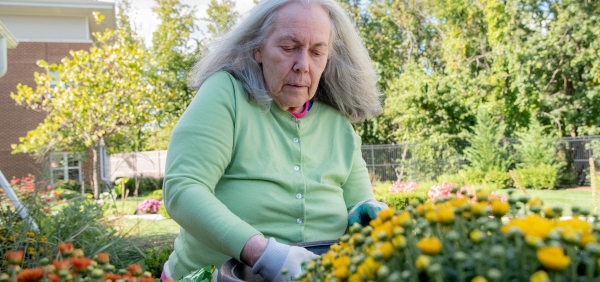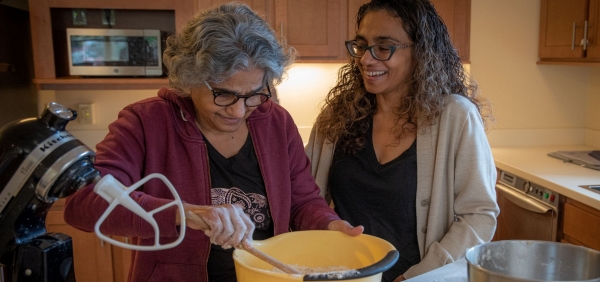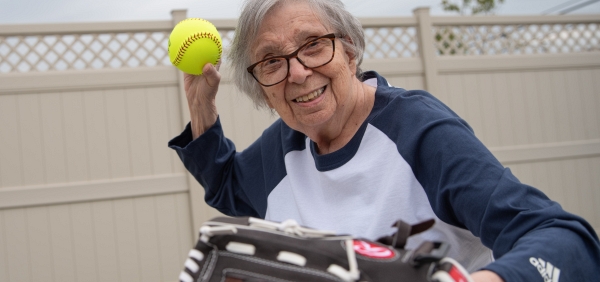Thoughtful Activities Give People with Alzheimer’s a Sense of Purpose

Meaningful Activities for People with Dementia
Living with Alzheimer’s disease, a form of dementia, can be deeply emotionally difficult, even in the earliest stages. Dementia can also be difficult for the caregiver. It’s important to realize that every stage of dementia is different, and every person is unique, and will exhibit symptoms in their own way.
There is so much research happening in the study of Alzheimer’s, and though there is still no cure, great strides have been made in the understanding of specialized care, leading to improvements in quality of life. For example, it’s now understood that helping people with dementia feel a sense of accomplishment and purpose can greatly help with memory care.
There’s a well-known study by Rush University Medical Center that supports this claim. More than 1,400 seniors were monitored over a 15-year period. Those who felt they had a greater sense of purpose in life had a 30% lower rate of cognitive decline than seniors who claimed to have a low level of purpose.
Engaging in meaningful activities improves the day-to-day life of people living with dementia, providing a sense of purpose and even possibly slowing progression of the condition.
So, how can a caregiver provide meaningful activities for people with dementia? Below is a list of activities that have been shown to provide a sense of purpose.
The Real Meaning of “Meaningful”
It’s important to remember that each person living with dementia is an individual, with unique likes, hobbies and interests. If an activity is going to be meaningful through the various stages of dementia, it must have been of interest before its onset. If a person once kept to a regular schedule for certain favorite activities, like a morning walk, or knitting after lunch, sticking to that schedule after the onset of dementia can bring familiarity and a sense of calm.
It’s also beneficial to realize that the word “activity” is going to change as dementia progresses. In the early stages, people can be encouraged to be active participants, get exercise and be productive. In the middle and later stages of dementia, it can be enough to have a person participate passively, closely observing an activity, feeling immersed in it even if it’s being partially or entirely carried out by a caregiver.
Activities for People with Dementia
If a person enjoyed exercise in the past, it’s a great idea to keep up as much physical activity as possible. It boosts mood and can help regulate sleep. Going for a walk allows for fresh air, and can stimulate the senses with sights, sounds and smells.
Other outdoor activities can be enjoyable. Gardening, weeding and light yardwork can be great exercise and fun for those who love being in nature. If the physical demands of such activities are too much, sitting in a park, visiting a botanical garden, or watching a nature documentary can be a satisfying way to spend some time.
Regular daily errands can stimulate memories of an active lifestyle and promote a sense of productivity. A trip to the grocery store or clothes shopping can be an enjoyable activity. Chores around the house will feel familiar, useful, and be a good source of light exercise. Folding shirts or matching socks can be stimulating. In later stages of dementia, simply being present, like standing by the sink while the dishes are being washed, can feel familiar and promote a good mood.
Any hobby that was a favorite can be explored to the extent of a person’s ability. Painting, knitting, woodwork, or decorating provide great sensory stimulation. If dementia has progressed, you can consider adult coloring books, fitting nuts and bolts together, jigsaw puzzles, or matching shapes and colors. In later stages, a box of brightly colored yarn or other safe materials can create a positive sensory experience.
A photo album or framed photos of people and places from years ago can greatly stimulate thoughts and emotions. In earlier stages of dementia, you can ask all sorts of questions and learn about their younger days. This can bring you closer together. In later stages, you can tell them what they’d previously shared with you as a way to provide a sense of emotional fulfillment and trigger long-term memory.
If reading was an enjoyable pastime, you can read favorite stories, or play an audio book for them to listen to.
And music can be a powerful emotional trigger. It can perk someone up, or calm them down. Just be sure to play their favorite tunes and find a volume that’s pleasant so it doesn’t cause agitation.
Pets can also be a great emotional comfort. If they love animals, maybe there’s a dog or cat companion in the home. If caring for a pet isn’t realistic, you may be able to find a friend with a dog or cat with the right personality to come for a visit every so often.
It’s the Journey that Matters
As a caregiver, remember that the point of any of these activities is to encourage a sense of accomplishment, allow for self-expression, create emotional connections with loved ones, and stimulate long-term memory.
The outcome of any activity doesn’t matter. Painting, folding clothes, baking cupcakes, or crafting – it’s only the process itself, the time spent doing something they enjoy, with people they care about, that matters. When expectations of any specific result are removed, the activity can be actively or passively enjoyed, without criticism or judgment, and only with pleasure and purpose.
And if an activity that usually brings a smile is resisted for any reason, simply set it aside and save it for another time.
The Artis Way
The science of Memory Care is constantly advancing, and new techniques to help people living with dementia are always on the horizon. Involving experts in the caregiving process is essential for success. Being the caregiver for a loved one with dementia can be physically and emotionally exhausting, and a quality Memory Care community can be a wonderful option for everyone’s happiness and peace of mind.
The Artis Way enlists a team of experts and specialists, including your loved one’s doctor. Working in harmony with your loved one and family caregivers, a holistic approach to well-being will be carefully curated for each individual, focusing solely on their preferences, passions and personal history. The environment we create encourages every resident to spend their time as they desire, with no mandatory group activities.
We’re not just experts, we’re partners in every respect, at every stage. We engage in frequent and transparent communication with your loved one and all concerned. We provide 24-hour care and supervision, with proactive safety measures and monitoring.
The Artis Way is different for everyone. Our approach is as unique as each person we serve. Our residents are invited to speak their mind at regular Town Hall meetings, and express dining preferences in our Time to Dish sessions. Our process adapts and evolves with each unique and special resident. Our goal is to provide comfort, dignity and purpose.
To find out more about The Artis Way or locate a specific Artis community, contact us.



